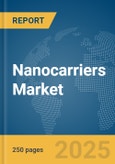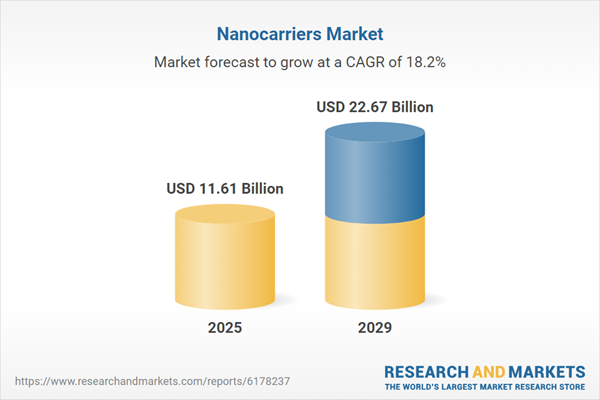The nanocarriers market size is expected to see rapid growth in the next few years. It will grow to $22.67 billion in 2029 at a compound annual growth rate (CAGR) of 18.2%. The growth during the forecast period can be attributed to the expanding aging population, continued increase in lifestyle related diseases, rising use of metal and metallic oxide particles, growing focus on personalized medicine, and greater participation in clinical trials. Key trends in the forecast period include advancements in healthcare technologies, creation of personalized and responsive drug delivery systems, development of stimuli responsive nanocarriers, progress in 3D printing technologies, and emergence of versatile nanocarrier platforms.
The growing demand for personalized medicines is expected to drive significant growth in the nanocarriers market. Personalized medicine involves tailoring medical treatments to the unique genetic, biomarker, and molecular characteristics of each patient. This trend is gaining momentum, particularly in cancer treatment, where doctors can customize therapies based on a patient's genetic profile, improving efficacy and minimizing side effects. Nanocarriers play a critical role in personalized medicine by delivering drugs directly to specific targets, controlling their release, enhancing bioavailability, and enabling individualized combination therapies. For instance, in February 2024, the Personalized Medicine Coalition, a US-based non-profit, reported that the FDA approved 16 new personalized therapies for rare diseases in 2023, a sharp increase from six in 2022. As a result, the increasing demand for personalized medicines is driving the growth of the nanocarriers market.
Leading companies in the nanocarriers market are focusing on developing advanced lipid nanoparticle formulations to enhance targeted drug delivery and therapeutic effectiveness. Lipid nanoparticle technologies are nanoscale, fat-based carriers designed to safely and efficiently deliver drugs or genetic therapies to specific cells or tissues. For example, in July 2023, Cytiva, a US-based biotechnology company, launched the NanoAssemblr commercial formulation system. This fully automated, single-use platform is designed for end-to-end clinical and commercial manufacturing of lipid nanoparticle (LNP) medicines. The system uses Cytiva’s NxGen technology to provide consistent, reproducible mixing, ensuring quality from research to large-scale manufacturing. It also reduces contamination risks through its single-use fluid path and supports efficient multi-product manufacturing in one facility. Additionally, the platform includes regulatory-compliant software that automates workflows and enables electronic batch records, simplifying the production of mRNA vaccines, gene therapies, and cancer vaccines.
In August 2024, VION Biosciences LLC, a US-based life sciences platform company, acquired Echelon Biosciences Inc. for an undisclosed amount. This acquisition aims to enhance VION’s ability to support customers focused on delivering mRNA and gene-based biotherapeutics. The deal strengthens VION's drug discovery and preclinical capabilities while facilitating its entry into the drug manufacturing sector. Echelon Biosciences is a biotechnology company that manufactures lipid nanoparticles (LNPs), which are vital for the delivery of mRNA-based therapies.
Major players in the nanocarriers market are F. Hoffmann-La Roche Ltd, Pfizer Inc., Sanofi S.A., Novartis AG, Bristol-Myers Squibb Company, Amgen Inc., Evonik Industries AG, Matinas BioPharma Holdings Inc., Luye Pharma Group Ltd., Ascendia Pharmaceuticals Inc., Arcturus Therapeutics Holdings Inc., Nanobiotix S.A., Polymun Scientific Immunbiologische Forschung GmbH, ReCode Therapeutics Inc., Celsion Corporation, Starpharma Holdings Limited, EnGeneIC Ltd., Acuitas Therapeutics Inc., Altamira Therapeutics Ltd., Nanexa AB.
North America was the largest region in the nanocarriers market in 2024. The regions covered in nanocarriers report are Asia-Pacific, Western Europe, Eastern Europe, North America, South America, Middle East and Africa. The countries covered in the nanocarriers market report are Australia, Brazil, China, France, Germany, India, Indonesia, Japan, Russia, South Korea, UK, USA, Canada, Italy, Spain.
Note that the outlook for this market is being affected by rapid changes in trade relations and tariffs globally. The report will be updated prior to delivery to reflect the latest status, including revised forecasts and quantified impact analysis. The report’s Recommendations and Conclusions sections will be updated to give strategies for entities dealing with the fast-moving international environment.
The sudden escalation of U.S. tariffs and the consequent trade frictions in spring 2025 are severely impacting the pharmaceutical companies contend with tariffs on APIs, glass vials, and lab equipment inputs with few alternative sources. Generic drug makers, operating on razor-thin margins, are especially vulnerable, with some reducing production of low-profit medicines. Biotech firms face delays in clinical trials due to tariff-related shortages of specialized reagents. In response, the industry is expanding API production in India and Europe, increasing inventory stockpiles, and pushing for trade exemptions for essential medicines.
Nanocarriers are nanoscale delivery systems specifically designed to transport drugs, genes, or other therapeutic agents with high precision, ensuring they reach the targeted cells or tissues within the body. These carriers enhance the stability and bioavailability of therapeutic compounds, provide controlled and sustained release, and reduce the risk of side effects by limiting exposure to healthy tissues.
The primary categories of nanocarriers include polymeric nanocarriers, lipid based nanocarriers, inorganic nanocarriers, and others. Polymeric nanocarriers are nanoscale polymer based systems created to deliver drugs or therapeutic agents effectively to specific sites in the body. They are applied in areas such as drug delivery, diagnostics, vaccines, gene therapy, and more, supporting end users such as pharmaceutical and biotechnology companies, hospitals and clinics, research institutes, and other organizations.
The nanocarriers market research report is one of a series of new reports that provides nanocarriers market statistics, including nanocarriers industry global market size, regional shares, competitors with a nanocarriers market share, detailed nanocarriers market segments, market trends and opportunities, and any further data you may need to thrive in the nanocarriers industry. This nanocarriers market research report delivers a complete perspective of everything you need, with an in-depth analysis of the current and future scenario of the industry.
The nanocarriers market consists of sales of polymeric nanoparticles, nanocrystals, carbon nanotubes, exosomes, and quantum dots. Values in this market are ‘factory gate’ values, that is, the value of goods sold by the manufacturers or creators of the goods, whether to other entities (including downstream manufacturers, wholesalers, distributors, and retailers) or directly to end customers. The value of goods in this market includes related services sold by the creators of the goods.
The market value is defined as the revenues that enterprises gain from the sale of goods and/or services within the specified market and geography through sales, grants, or donations in terms of the currency (in USD unless otherwise specified).
The revenues for a specified geography are consumption values and are revenues generated by organizations in the specified geography within the market, irrespective of where they are produced. It does not include revenues from resales along the supply chain, either further along the supply chain or as part of other products.
This product will be delivered within 3-5 business days.
Table of Contents
Executive Summary
Nanocarriers Global Market Report 2025 provides strategists, marketers and senior management with the critical information they need to assess the market.This report focuses on nanocarriers market which is experiencing strong growth. The report gives a guide to the trends which will be shaping the market over the next ten years and beyond.
Reasons to Purchase:
- Gain a truly global perspective with the most comprehensive report available on this market covering 15 geographies.
- Assess the impact of key macro factors such as geopolitical conflicts, trade policies and tariffs, post-pandemic supply chain realignment, inflation and interest rate fluctuations, and evolving regulatory landscapes.
- Create regional and country strategies on the basis of local data and analysis.
- Identify growth segments for investment.
- Outperform competitors using forecast data and the drivers and trends shaping the market.
- Understand customers based on the latest market shares.
- Benchmark performance against key competitors.
- Suitable for supporting your internal and external presentations with reliable high quality data and analysis
- Report will be updated with the latest data and delivered to you along with an Excel data sheet for easy data extraction and analysis.
- All data from the report will also be delivered in an excel dashboard format.
Description
Where is the largest and fastest growing market for nanocarriers? How does the market relate to the overall economy, demography and other similar markets? What forces will shape the market going forward, including technological disruption, regulatory shifts, and changing consumer preferences? The nanocarriers market global report answers all these questions and many more.The report covers market characteristics, size and growth, segmentation, regional and country breakdowns, competitive landscape, market shares, trends and strategies for this market. It traces the market’s historic and forecast market growth by geography.
- The market characteristics section of the report defines and explains the market.
- The market size section gives the market size ($b) covering both the historic growth of the market, and forecasting its development.
- The forecasts are made after considering the major factors currently impacting the market. These include: technological advancements such as AI and automation, Russia-Ukraine war, trade tariffs (government-imposed import/export duties), elevated inflation and interest rates.
- Market segmentations break down the market into sub markets.
- The regional and country breakdowns section gives an analysis of the market in each geography and the size of the market by geography and compares their historic and forecast growth.
- The competitive landscape chapter gives a description of the competitive nature of the market, market shares, and a description of the leading companies. Key financial deals which have shaped the market in recent years are identified.
- The trends and strategies section analyses the shape of the market as it emerges from the crisis and suggests how companies can grow as the market recovers.
Report Scope
Markets Covered:
1) By Type: Polymeric Nanocarriers; Lipid-Based Nanocarriers; Inorganic Nanocarriers; Other Types2) By Application: Drug Delivery; Diagnostics; Vaccines; Gene Therapy; Other Applications
3) By End-User: Pharmaceutical And Biotechnology Companies; Hospitals And Clinics; Research Institutes; Other End-Users
Subsegments:
1) By Polymeric Nanocarriers: Nanoparticles Of Poly Lactic Acid; Nanoparticles Of Poly Lactic-Co-Glycolic Acid; Nanoparticles Of Chitosan; Nanoparticles Of Gelatin; Nanoparticles Of Polycaprolactone2) By Lipid-Based Nanocarriers: Solid Lipid Nanoparticles; Nanostructured Lipid Carriers; Liposomes; Nanoemulsions; Self-Emulsifying Drug Delivery Systems
3) By Inorganic Nanocarriers: Gold Nanoparticles; Silver Nanoparticles; Silica Nanoparticles; Magnetic Nanoparticles; Quantum Dots
4) By Other Types: Dendrimers; Protein-Based Nanocarriers; Carbon Nanotubes; Nanocrystals; Exosomes
Companies Mentioned: F. Hoffmann-La Roche Ltd; Pfizer Inc.; Sanofi S.A.; Novartis AG; Bristol-Myers Squibb Company; Amgen Inc.; Evonik Industries AG; Matinas BioPharma Holdings Inc.; Luye Pharma Group Ltd.; Ascendia Pharmaceuticals Inc.; Arcturus Therapeutics Holdings Inc.; Nanobiotix S.A.; Polymun Scientific Immunbiologische Forschung GmbH; ReCode Therapeutics Inc.; Celsion Corporation; Starpharma Holdings Limited; EnGeneIC Ltd.; Acuitas Therapeutics Inc.; Altamira Therapeutics Ltd.; Nanexa AB
Countries: Australia; Brazil; China; France; Germany; India; Indonesia; Japan; Russia; South Korea; UK; USA; Canada; Italy; Spain
Regions: Asia-Pacific; Western Europe; Eastern Europe; North America; South America; Middle East; Africa
Time Series: Five years historic and ten years forecast.
Data: Ratios of market size and growth to related markets, GDP proportions, expenditure per capita
Data Segmentation: Country and regional historic and forecast data, market share of competitors, market segments.
Sourcing and Referencing: Data and analysis throughout the report is sourced using end notes.
Delivery Format: PDF, Word and Excel Data Dashboard.
Companies Mentioned
The companies featured in this Nanocarriers market report include:- F. Hoffmann-La Roche Ltd
- Pfizer Inc.
- Sanofi S.A.
- Novartis AG
- Bristol-Myers Squibb Company
- Amgen Inc.
- Evonik Industries AG
- Matinas BioPharma Holdings Inc.
- Luye Pharma Group Ltd.
- Ascendia Pharmaceuticals Inc.
- Arcturus Therapeutics Holdings Inc.
- Nanobiotix S.A.
- Polymun Scientific Immunbiologische Forschung GmbH
- ReCode Therapeutics Inc.
- Celsion Corporation
- Starpharma Holdings Limited
- EnGeneIC Ltd.
- Acuitas Therapeutics Inc.
- Altamira Therapeutics Ltd.
- Nanexa AB
Table Information
| Report Attribute | Details |
|---|---|
| No. of Pages | 250 |
| Published | October 2025 |
| Forecast Period | 2025 - 2029 |
| Estimated Market Value ( USD | $ 11.61 Billion |
| Forecasted Market Value ( USD | $ 22.67 Billion |
| Compound Annual Growth Rate | 18.2% |
| Regions Covered | Global |
| No. of Companies Mentioned | 21 |









